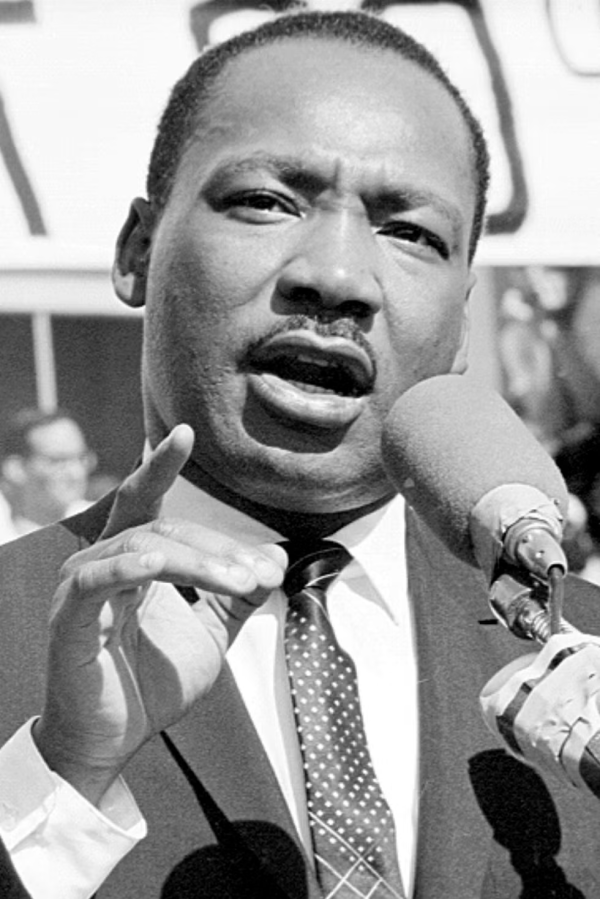
Today’s Leader of Faith
MARTIN LUTHER KING Jr. Martyr
Home Call : 04 April 1968
Baptist Preacher, Theologian, Father of Civil Rights Movement, Activist, Political Philosopher.
Martin Luther King Jr. (1929–1968) was a Baptist minister and a key leader in the American civil rights movement. He advocated for racial equality through nonviolent resistance. He was a rational and devoted pastor, who with his spiritual wisdom changed the lives of many. He taught the church to keep God in the forefront and lead a practical Christian life. He was a tough preacher and never backed out to correct fellow believers and authorities when necessary. He also shared the pulpit ministry with Dr. Billy Graham in his gospel crusades. He deeply believed in the teachings of Lord Jesus Christ, particularly the principles of love, justice, and nonviolence. Inspired by his faith and the example of Jesus, he preached forgiveness, nonviolent resistance, and the belief that all people are created in God’s image and are equal in the sight of God. His Christian convictions shaped his commitment to justice and equality, making his activism not just political but also deeply rooted in his faith in God. He led major events like the Montgomery bus boycott, the Birmingham protests, and the 1963 March on Washington, where he delivered his famous “I Have a Dream” speech. His efforts contributed to landmark legislation, including the Civil Rights Act (1964) and the Voting Rights Act (1965). King opposed poverty and the Vietnam War in his later years. He was assassinated in 1968, sparking national mourning. He was posthumously honored with the Nobel Peace Prize, the Presidential Medal of Freedom, and a federal holiday in his name. His fight for civil rights and racial equality laid the foundation for future African Americans to fully participate in American democracy, including running for and winning the presidency. His vision of justice and equality ultimately made it possible for Barack Obama to become the first Black president of the United States in 2008, marking a historic moment in American history.
King was born on January 15, 1929, in Atlanta, Georgia. Raised in a devout Baptist family, he grew up in Ebenezer Baptist Church, where his father was a pastor. Despite early doubts about certain religious teachings, he eventually embraced Christianity fully and saw it as a means to promote justice and equality. At Morehouse College, under the mentorship of Dr. Benjamin Mays, King deepened his understanding of faith’s role in social activism. He later pursued theological studies at Crozer Theological Seminary and earned a Doctor of Philosophy in Systematic Theology from Boston University. Influenced by Jesus’ teachings on love and nonviolence, as well as Mahatma Gandhi’s philosophy, he committed himself to peaceful resistance against racial injustice.
King played a crucial role in shaping the United States by leading the civil rights movement. His leadership in the Civil Rights Movement was deeply rooted in his Christian beliefs. He preached love, forgiveness, and nonviolent protest, seeing civil rights as a moral and spiritual struggle. His famous speeches, including “I Have a Dream,” often referenced biblical themes, emphasizing justice, brotherhood, and God’s will for equality among all people. His activism directly influenced major legal changes such as, Civil Rights Act of 1964, Voting Rights Act of 1965 and Fair Housing Act of 1968. Through nonviolent protests like the Montgomery Bus Boycott (1955-56), sit-ins, and the Freedom Rides, King helped dismantle segregation laws, ensuring African Americans could access public spaces, schools, and services equally. By advocating for voting rights, he expanded democracy, ensuring that African Americans and marginalized groups had political representation. His philosophy of nonviolence inspired later movements, including Black Lives Matter, labor rights movements, and global human rights campaigns.
King was assassinated on April 4, 1968, in Memphis, Tennessee. He was staying at the Lorraine Motel while supporting the sanitation workers’ strike, a movement for economic justice for Black workers. He was standing on the balcony of the Lorraine Motel when he was shot by a sniper. The bullet struck him in the jaw and severed his spinal cord. He was rushed to St. Joseph’s Hospital, where he was pronounced dead. King has received several honorary doctorates. Martin Luther King Jr. Day is a U.S. federal holiday observed on the third Monday of January each year. It was signed into law by President Ronald Reagan in 1983. Many memorial sites, buildings, and sculptures have been created to honor Martin Luther King Jr., including the Martin Luther King Jr. Memorial Library in Washington, D.C.; the Dr. Martin Luther King Jr. Library in San Jose, California; and the Martin Luther King Jr. Memorial in West Potomac Park, next to the National Mall in Washington, D.C.
